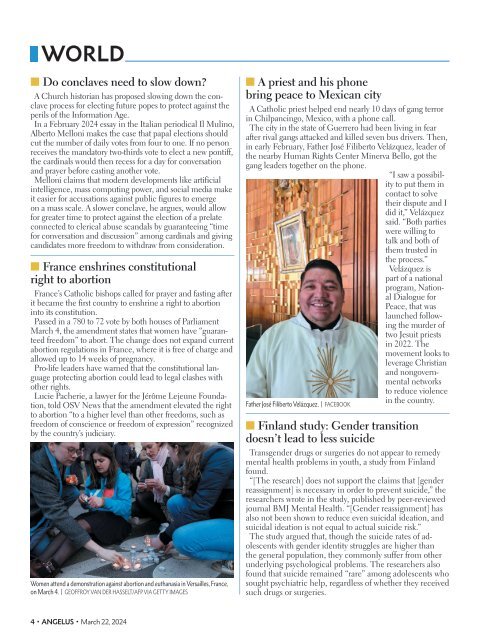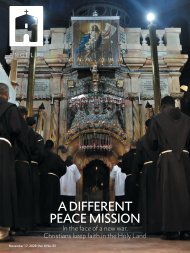Angelus News | March 22, 2024 | Vol. 9 No. 6
On the cover: To cap off a nearly five-decades-long career working in Church communications, Francis X. Maier had an ambitious book idea: a ‘snapshot’ of the Church in America at this time in history that captured both its strengths and its sicknesses. On Page 10, Maier shares what he took away from hearing more than 100 “confessions”’ with American Catholic leaders for the project. On Page 20, John L. Allen Jr. offers his own diagnosis of the uneasy relationship between U.S. Catholics and Rome during the Pope Francis pontificate.
On the cover: To cap off a nearly five-decades-long career working in Church communications, Francis X. Maier had an ambitious book idea: a ‘snapshot’ of the Church in America at this time in history that captured both its strengths and its sicknesses. On Page 10, Maier shares what he took away from hearing more than 100 “confessions”’ with American Catholic leaders for the project. On Page 20, John L. Allen Jr. offers his own diagnosis of the uneasy relationship between U.S. Catholics and Rome during the Pope Francis pontificate.
Create successful ePaper yourself
Turn your PDF publications into a flip-book with our unique Google optimized e-Paper software.
WORLD<br />
■ Do conclaves need to slow down?<br />
A Church historian has proposed slowing down the conclave<br />
process for electing future popes to protect against the<br />
perils of the Information Age.<br />
In a February <strong>2024</strong> essay in the Italian periodical Il Mulino,<br />
Alberto Melloni makes the case that papal elections should<br />
cut the number of daily votes from four to one. If no person<br />
receives the mandatory two-thirds vote to elect a new pontiff,<br />
the cardinals would then recess for a day for conversation<br />
and prayer before casting another vote.<br />
Melloni claims that modern developments like artificial<br />
intelligence, mass computing power, and social media make<br />
it easier for accusations against public figures to emerge<br />
on a mass scale. A slower conclave, he argues, would allow<br />
for greater time to protect against the election of a prelate<br />
connected to clerical abuse scandals by guaranteeing “time<br />
for conversation and discussion” among cardinals and giving<br />
candidates more freedom to withdraw from consideration.<br />
■ France enshrines constitutional<br />
right to abortion<br />
France’s Catholic bishops called for prayer and fasting after<br />
it became the first country to enshrine a right to abortion<br />
into its constitution.<br />
Passed in a 780 to 72 vote by both houses of Parliament<br />
<strong>March</strong> 4, the amendment states that women have “guaranteed<br />
freedom” to abort. The change does not expand current<br />
abortion regulations in France, where it is free of charge and<br />
allowed up to 14 weeks of pregnancy.<br />
Pro-life leaders have warned that the constitutional language<br />
protecting abortion could lead to legal clashes with<br />
other rights.<br />
Lucie Pacherie, a lawyer for the Jérôme Lejeune Foundation,<br />
told OSV <strong>News</strong> that the amendment elevated the right<br />
to abortion “to a higher level than other freedoms, such as<br />
freedom of conscience or freedom of expression” recognized<br />
by the country’s judiciary.<br />
Women attend a demonstration against abortion and euthanasia in Versailles, France,<br />
on <strong>March</strong> 4. | GEOFFROY VAN DER HASSELT/AFP VIA GETTY IMAGES<br />
■ A priest and his phone<br />
bring peace to Mexican city<br />
A Catholic priest helped end nearly 10 days of gang terror<br />
in Chilpancingo, Mexico, with a phone call.<br />
The city in the state of Guerrero had been living in fear<br />
after rival gangs attacked and killed seven bus drivers. Then,<br />
in early February, Father José Filiberto Velázquez, leader of<br />
the nearby Human Rights Center Minerva Bello, got the<br />
gang leaders together on the phone.<br />
“I saw a possibility<br />
to put them in<br />
contact to solve<br />
their dispute and I<br />
did it,” Velázquez<br />
said. “Both parties<br />
were willing to<br />
talk and both of<br />
them trusted in<br />
the process.”<br />
Velázquez is<br />
part of a national<br />
program, National<br />
Dialogue for<br />
Peace, that was<br />
launched following<br />
the murder of<br />
two Jesuit priests<br />
in 20<strong>22</strong>. The<br />
movement looks to<br />
leverage Christian<br />
and nongovernmental<br />
networks<br />
to reduce violence<br />
in the country.<br />
Father José Filiberto Velázquez. | FACEBOOK<br />
■ Finland study: Gender transition<br />
doesn’t lead to less suicide<br />
Transgender drugs or surgeries do not appear to remedy<br />
mental health problems in youth, a study from Finland<br />
found.<br />
“[The research] does not support the claims that [gender<br />
reassignment] is necessary in order to prevent suicide,” the<br />
researchers wrote in the study, published by peer-reviewed<br />
journal BMJ Mental Health. “[Gender reassignment] has<br />
also not been shown to reduce even suicidal ideation, and<br />
suicidal ideation is not equal to actual suicide risk.”<br />
The study argued that, though the suicide rates of adolescents<br />
with gender identity struggles are higher than<br />
the general population, they commonly suffer from other<br />
underlying psychological problems. The researchers also<br />
found that suicide remained “rare” among adolescents who<br />
sought psychiatric help, regardless of whether they received<br />
such drugs or surgeries.<br />
4 • ANGELUS • <strong>March</strong> <strong>22</strong>, <strong>2024</strong>

















